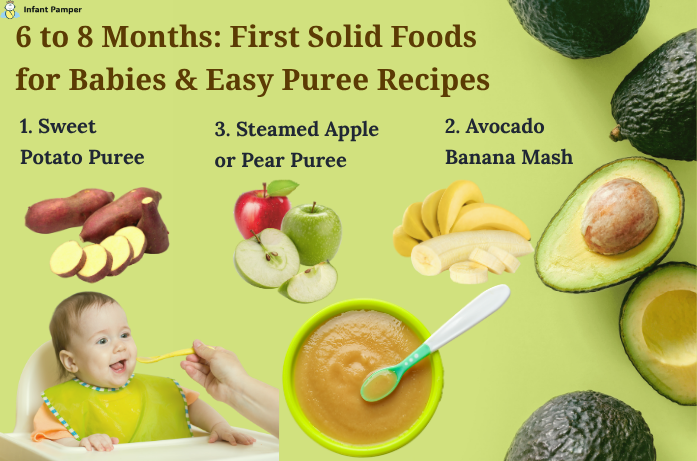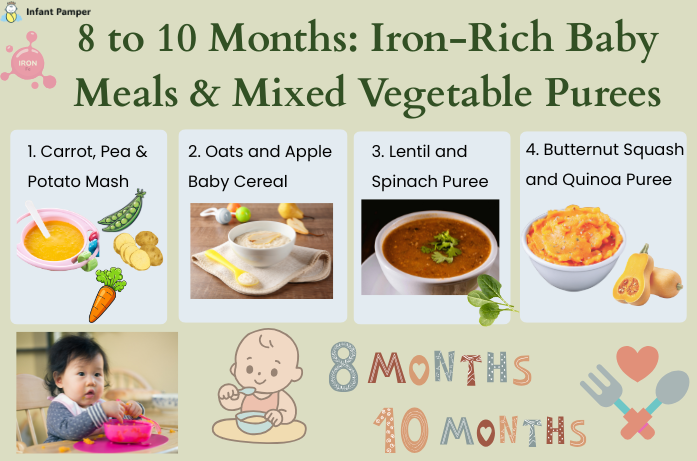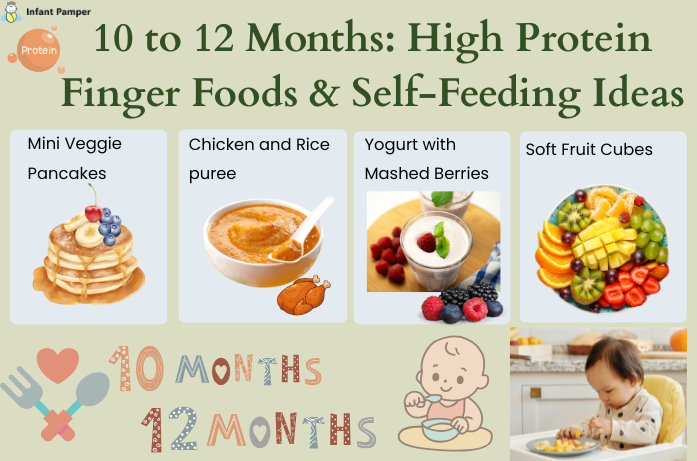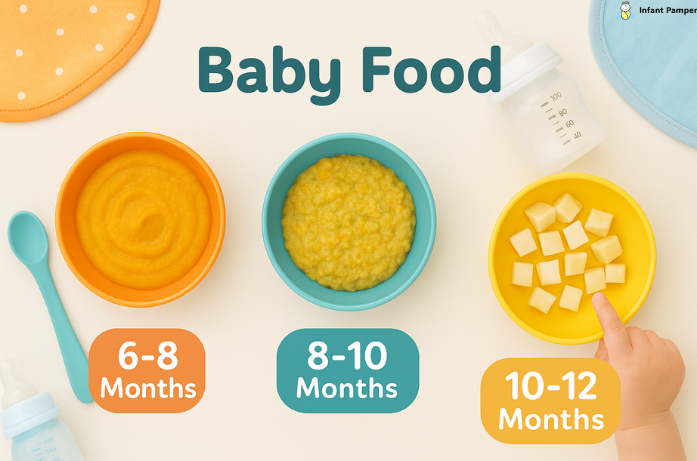By a caring mom at Infant Pamper
Wondering what to feed your baby as they start on solids? You are not the only one. This is one of those huge milestones in your baby’s development that can still feel daunting. With the right guidance, you can maneuver through this transition in a smooth, fun, and healthy manner.
This guide provided by Infant Pamper is filled with nutritious baby food recipes, best first foods for babies, and tips for every phase of baby-led weaning (BLW) or spoon-feeding. From 6 months old to almost toddlers, these homemade baby food recipes are balanced with nutrition and support healthy infant growth.
Why Homemade Baby Food Is Better for Your Baby
Choosing homemade baby food over store-bought options gives your little one a healthier and safer start. When you make baby meals at home, you have full control over ingredients, no hidden preservatives, added sugars, or excess salt.
Homemade food is fresher and more nutritious, helping your baby get essential vitamins and minerals for healthy growth and brain development. You can introduce a variety of flavors and textures, which supports taste exploration and reduces picky eating as your baby grows.
It’s also cost-effective, preparing baby food in bulk and storing it in small portions saves both money and time. Whether you’re doing spoon-feeding or baby-led weaning, homemade meals can be tailored to suit your baby’s age and dietary needs.
Most importantly, making food at home builds your confidence as a parent. You know exactly what’s going into your baby’s body, and that peace of mind is priceless.
Homemade baby food isn’t just a trend, it’s a smart, nourishing choice for your baby’s first bites.
Trusted resources like the Centers for Disease Control and Prevention (CDC) recommend introducing fresh, simple foods to promote healthy eating habits early on.

6 to 8 Months: First Solid Foods for Babies & Easy Puree Recipes
This is the best age to introduce single-ingredient purees, soft foods suitable for toothless babies, and other nutritious options approved by many pediatric diet experts. Parents often call this stage a 6 month baby food chart.
1. Sweet Potato Puree
Ingredients: 1 small sweet potato
Instructions: Steam or roast until soft. Peel and blend with breastmilk or water.
Nutritional Value: Heavily packed with beta-carotene (Vitamin A), good for eye health.
2. Avocado Banana Mash
Ingredients: 1/2 ripe avocado, 1/2 ripe banana
Instructions: Mash both together until smooth.
Why It’s Great: Rich in healthy fats and potassium for brain and body development.
3. Steamed Apple or Pear Puree
Instructions: Steamed Apple or Pear Puree
Tip: Add breastmilk or formula for smoother texture.

8 to 10 Months: Iron-Rich Baby Meals & Mixed Vegetable Purees
By this time, the stage babies start appreciating thicker textures and iron-rich foods. That makes these great vegetarian baby food recipes and simple cute baby lunch ideas.
4. Carrot, Pea & Potato Mash
Ingredients: 1 small potato, 1 carrot, 1/2 cup peas
Instructions: Steam and mash or blend with a fork.
Why It Works: Colorful, sweet, and full of Vitamins A and C.
5. Oats and Apple Baby Cereal
Ingredients: 2 tbsp oats, 1/2 grated apple, 1/2 cup water or breastmilk
Instructions: Cook oats, stir in apple, blend if needed.
Nutritional Value: Iron-rich and helps with digestion.
6. Lentil and Spinach Puree
Ingredients: 1/4 cup red lentils, handful of chopped spinach
Instructions: Boil until soft and blend. Add garlic for mild flavor.
Why It’s Great: Iron, fiber, and protein-rich vegetarian baby food option.
7. Butternut Squash and Quinoa Puree
Ingredients: Roasted squash, cooked quinoa, water for blending
Why It’s Great: A wholesome, gluten-free baby meal.

10 to 12 Months: High Protein Finger Foods & Self-Feeding Ideas
Now your little one is eager for some self-feeding action! Put forth multiple soft, small, and grab-friendly options that help foster independence and make excellent finger food ideas for the baby.
8. Mini Veggie Pancakes
Ingredients: Grated carrot, spinach, 1 egg yolk, 2 tbsp flour
Instructions: Mix into batter, cook in small rounds.
Benefits: Builds fine motor skills and introduces new textures.
9. Chicken and Rice Puree
Ingredients: Cooked rice, shredded chicken, vegetable broth
Instructions: Mix and mash or lightly blend.
Protein Boost: Chicken is a great source of zinc and iron.
10. Yogurt with Mashed Berries
Ingredients: Full-fat plain yogurt, mashed strawberries or blueberries
Tip: Choose organic berries to avoid pesticides.
11. Soft Fruit Cubes
Examples: Banana slices, steamed apple chunks, ripe pear bits
Important: Always cut into safe sizes and supervise feeding.
Top Superfoods for Babies (6–12 Months)
According to the World Health Organization (WHO), these foods are ideal for building a strong foundation:
| Superfood | Key Benefits | How to Serve Safely |
| Avocado | Healthy fats for brain development | Mashed or sliced into soft strips |
| Sweet Potato | High in Vitamin A and fiber | Steamed, mashed, or cut into soft cubes |
| Egg Yolk | Rich in iron, choline, and fat | Cooked thoroughly, mashed or mixed into porridge |
| Lentils | Great plant protein and iron | Well-cooked, mashed or pureed |
| Full-Fat Yogurt | Provides calcium and probiotics | Plain, unsweetened, small spoonfuls |
| Blueberries | Antioxidants for immune support | Mashed, pureed, or cut into very small pieces |
| Chicken | Lean protein, zinc, and iron | Pureed, shredded, or finely chopped |
Tip: Always watch texture and size to avoid choking. Introduce new foods one at a time and observe for allergies.
Food Safety Guidelines for Babies
- No honey before 1 year: to prevent the risk of infant botulism.
- Avoid salt, sugar, and cow’s milk until after 12 months.
- Introduce new foods slowly: wait 3–5 days between each new food to monitor for reactions.
- Allergenic foods (like eggs, peanuts, dairy) should be introduced gradually and carefully.
- Always supervise mealtime to reduce choking risks.
Important: If your child has eczema, food sensitivities, or there is a family history of allergies, be sure to speak with your pediatrician.
Baby Food Storage Tips for Busy Parents
- Freeze purees in BPA-free ice cube trays for quick, single servings.
- Use airtight, labeled containers to keep food fresh and organized.
- Refrigerate safely, only for 1–2 days.
- Reheat once only, don’t reheat the same portion more than once.
Final Thoughts
Feeding your baby doesn’t have to be complicated. With these easy and nutritious homemade baby food recipes, you can give your baby the best start in life. These organic baby meal ideas and healthy food options for babies not only support development but also reduce the risk of picky eating later on.
Remember, each child is different. Keep an open mind, enjoy yourself, and celebrate the smallest victories (yes, even the messy ones!).
FAQs
1. How can I know when my baby is ready for solids?
Around 6 months if they can sit with support and show an interest in food.
2. Can I mix breastmilk or formula with baby food?
Yes, for consistency and taste that is familiar.
3. What if the baby just refuses new foods?
Don’t worry! It might take up to 10 exposures before a baby likes a new taste.
4. How many times should solids be fed to the baby in a day?
Begin introducing solids once to twice a day at 6 to 8 months. By 10 to 12 months, solids can be fed thrice along with snacks according to hunger and growth needs of the baby.
5. What would be suitable first foods to give to my baby?
Foods that are soft and with a single ingredient are considered good first foods: mashed avocado, mashed banana, or mashed sweet potato. They are easy to digest and provide essential nutrients for the growth of the baby.
6. When to start giving solids to the little one?
Most babies need to be given solids around 6 months of age when they can sit with support, show interest in food, and have good head control.
Disclaimer: For those seeking educational resources only, it is recommended to always consult with a pediatrician before giving a child new foods, especially allergens.
Feeding babies need not be complicated. With these easy and healthy recipes, your babies will develop while forming its healthy eating habits and happy mealtime memories (with messiness, of course). Every baby is different, so take it slow, enjoy the process, and celebrate any small wins.
Explore more on baby feeding tips, developmental milestones, and toddler activities at Infant Pamper, the parenting partner you can trust.




